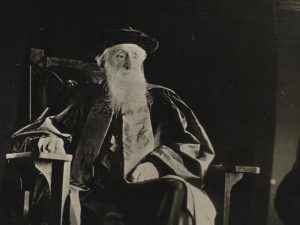By Lee Strobel–
Lee Strobel—atheist-turned-Christian and best-selling author of more than 20 books, including “The Case for Christ”—was the featured speaker at a recent event of The Salvation Army Western Territory. Here is what he had to say, via video.
I wish I could be with you live, but as you know with the pandemic, everybody’s hunkering down— I’m hunkering down here in my home in Houston, Texas. I moved down here five years ago with my wife to be close to our two oldest grandchildren.
I’m from Chicago. I don’t know anything about Texas. I went on Amazon and bought a book called “How to Talk Texan,” and I learned a lot. The first thing I learned: the difference between y’all and all y’all. All y’all is plural. I never thought about that, but it makes sense. Then I learned this, and this is what I love most about talking Texan, in Texas, if you want to say “thank you” to someone, you could say, “thank you” or you can say “appreciate you.”
I was thinking, you know what? I appreciate you. I appreciate you and what you do. You’re going to hear a little later The Salvation Army played an important role in my spiritual journey of coming to faith in Jesus, but as I was thinking about you and this event and what to talk about, a passage came to mind from the greatest sermon ever delivered: The Sermon on the Mount, where, 2,000 years ago, Jesus stood on a hillside speaking to a group of people.
But, I think he was also looking down through history to you today, and this is what he said. He said: “You are the salt of the earth…You are the light of the world, a city on a hill cannot be hidden neither do people light a lamp and put it under a bowl, instead they put it on a stand and it gives light to everyone in the house. In the same way, let your light shine among others that they may see your good deeds and praise your Father in heaven.”
What did he mean by those metaphors of salt and light? I think he was saying, “Look, if you’re going to be a follower of mine, I want you to live lives that are like salt and make people thirst for God. I want you to live lives that are like light that shine a message of hope and grace and love and forgiveness and eternal life—that shine that message in the dark areas of despair,” and what I want to talk about is: What does that look like to be strong salt and bright light in the 21st century? How can we do that?
I thought, well, what if Jesus physically lived in my house? What if I could observe him as he would interact with neighbors and go to the grocery store? What lessons would I learn? There’s so much to learn from the life of Jesus, but there’s a few things that I want to highlight in the next few minutes.
Jesus prayed
The first one is this: I think if Jesus physically lived in my house, that before he talked to his neighbor about their Heavenly Father, he talked to his Heavenly Father about his neighbor. In other words, he’d pray.
Before Jesus embarked on anything of significance, he brought it to the Father in prayer. In fact, if you’ve ever thought about the fact that Jesus’ prayers for spiritually lost people continued right up until his final gasps on the cross, that when you read the New Testament in the original Greek in which it is written, you see it suggests by the imperfect tense of the Greek that Jesus didn’t just say it once, but he kept repeating all through the torture of the crucifixion.
While the nails are being driven through his hands, while the nails which were being driven through his feet, he kept praying “Father, forgive them. Father, forgive them. Father, forgive them for they don’t know what they do.” Jesus’ prayers for people so spiritually depraved they were torturing to death the son of God continued right up until his final gasps, and as pastor John Stott said, in light of that, how can we justify not praying consistently and fervently and expectantly for lost people in our lives?
I think if Jesus lived in my house, that’s the one thing I’d see him doing, is praying. Now I know that I can’t force someone against their will, through my prayers, to become a follower of Jesus. I get that. But you know what? I’m just naive enough to believe James when he said the prayers of righteous people make a difference. I believe they do.
I’ve seen in my own life, where I was an angry atheist and began to investigate Christianity because my wife had become a Christian. And for two years, while I was on that journey, she prayed for me fervently, effectively, consistently. She prayed Ezekiel 36:26 that says: Moreover, I will give you a new heart and put a new spirit within you. I removed from you your heart of stone and gave you a heart of flesh. That she would pray, “God, I can’t penetrate Lee’s hard, stony heart. Only you can.” She prayed for me and God answered that prayer.
In fact, here’s a convicting question: What if tonight Jesus physically appeared to you alone? You were alone in your room, Jesus appears and he looks at you and he says, “I am going to answer every single prayer that you prayed last week.” If Jesus said that to you tonight, would there be anybody new in the kingdom of God tomorrow? Are we praying?
Questions and doubts don’t keep us from Jesus
The second thing I think if Jesus physically lived in my house, is he would always let the neighbors know, “Hey, my door is always open for questions… Bring the coffee, we’ll sit on the floor. We’ll talk about it.”
I can’t think of any incident where Jesus slam-dunked anybody that came to him with a sincere question. Can you? In fact my favorite example of this is John the Baptist. If anybody should have been 100 percent certain about the identity of Jesus being the Son of God, it was John the Baptist.
He once pointed to Jesus and said, “Behold the Lamb of God who takes away the sin of the world.” He once pointed to Jesus and said, “I have seen and I testify this is the Son of God.” He baptized Jesus. He saw the heavens open up, and heard the voice of the Father saying, “This my son with whom I’m well pleased.”
But then what happens? He gets arrested. He is thrown in prison. Questioned. What happens to a lot of us when tough times come? Doubts begin to creep in, right? And that’s what happened to John.
Now he’s sitting in prison. Now he’s got some hesitation, so what does he do? He gets a couple friends together. He says, “Look, go track down Jesus. Just ask him once and for all point-blank: Are you the one we’ve been waiting for? Are we to wait for somebody else?”
So his friends do that. They tracked down Jesus. They ask him that question. How does Jesus react? Does Jesus get angry? Does Jesus say, “How dare John have the temerity to express a hesitation about my identity?”
Now Jesus said to those followers of John, “Go back to John and tell him what you have seen and heard. The blind receive sight. The lame walk. Those who have leprosy are cured. The deaf hear. The dead are raised, and the good news is preached to the poor.” In other words, “Go back to John and tell him about the evidence you’ve seen with your own eyes that convinces you that I am the one I claim to be.”
So they go back and they tell John, but here’s the deal: has this now disqualified John from any role in the kingdom of God because he dared to ask a question? No. It’s after this incident that Jesus gets up before the group and he says, “Among those born of women, there’s no one greater than John.” John, the guy who expressed hesitation—dare I say even a doubt.
Friends, it is OK for you and me, as followers of Jesus, to have questions. It’s even OK for us to have some doubts as long as we do what John did, and we pursue answers. And here’s the thing: all of us are told as followers of Jesus in 1 Peter 3:15 that we’re prepared to give an answer to everyone who asks us to give the reason for the hope that we have, and to do it gently and respectfully.
Because here’s the deal: so many people we encounter, so many of our friends, have a spiritual sticking point— you know, a doubt, a question, a concern that is holding them up in their journey toward God, and if we can help them get resolution of that issue, they can make progress toward the cross.
Now does that mean we have every answer on the tip of our tongue? I wish we did. I don’t. You probably don’t either, and that’s OK. It’s all right to sometimes say, “That’s a great question. I don’t know how to answer it, but let’s find an answer together.” There are plenty of resources out there: books and videos and so forth that we can bring our friend to, and together we can pursue an answer to whatever it is that’s holding them up in their eternity toward God.
The good news, friend, is we have a defensible faith. We do have good answers to the toughest questions of life and faith. I was an atheist trained in journalism and law. I spent two years of my life investigating the evidence for the truth of Christianity, and I became convinced that in light of the avalanche of evidence that points so powerfully toward the truth of Christianity, it would have taken more faith to maintain my atheism than become a Christian. So I think if Jesus lived in my house, he’d leave the door open, come on over. Got a question? Let’s sit down. Let’s talk about it. That’s how we can be salt and light today.
Jesus demonstrated his faith
Third thing: I think if Jesus physically lived in my house, he wouldn’t just share his faith, but he would show his faith. In other words, talk is cheap. Jesus didn’t just say he loved the world, he showed it. How? By restoring health to the lepers, by healing the blind and by ultimately going to the cross and paying for the sins of the world.
And here’s the thing: When we serve other people as Jesus did, when we sacrifice for other people as Jesus modeled, often this can penetrate the hardest of hearts, and this comes to the point of my little story about how The Salvation Army helped me.
When I was an atheist, I was a journalist at the Chicago Tribune. I was assigned to do a 30-part series on the poor of Chicago, so I thought, I’m an atheist. I don’t care about the poor. I
thought, what am I going to do? Where am I going to go and find some poor people? so I went to The Salvation Army homeless center on the Northwest side of Chicago, and I spent about two weeks there—almost lived there during that time to do research.
And I watched how those volunteers from The Salvation Army loved people that nobody else cared about, and they helped them get sober and helped them get off drugs and helped them get a job and helped them get food and helped love their children and helped them get an apartment and helped get them on their feet.
They loved these people that nobody else gave a rip about, and I watched this for about two weeks, and then, when I was done with my research, I went into the office of the woman who was in charge of the center. I said, “Well, I’m going to wrap up now. I’m going to go,” and she said, “Before you go— Lee I know you told me you’re an atheist, but I’m just curious: Who is Jesus to you?”
And I’ll tell you what: I was an angry atheist back then. If you ran into me on the sidewalk and you buttonholed me and pinned me up against a wall and tried to share Jesus with me, I would have spit in your face, but when she asked me about Jesus, she had a special credibility with me. Why? Because I had watched as she and her team and her volunteers loved people that nobody else gave a rip about, and that softened my heart and I was receptive.
I said, “tell me about him,” and we had a very profound conversation about Jesus Christ that day. That conversation and that experience with The Salvation Army was one of the links in the long chain of events and circumstances and evidence that ultimately led me to faith in Jesus
Christ, so I am forever grateful for how those in The Salvation Army live out that verse I recited earlier, Matthew 5:16 that says, Let your light shine among others, that they may see your good deeds and praise your Father in heaven.
The word in Greek there for “good” where it says “good deeds” doesn’t just refer to doing good deeds as opposed to bad, there’s another connotation as well: to do deeds that are winsome and attractive. In other words, to serve other people in a winsome and an attractive way that causes their eyes that drift heavenward toward our Heavenly Father who motivates you against the grain of this me-first culture. To put somebody else’s needs ahead of our own. That impacts people today in an incredibly profound way. I know that firsthand.
Jesus was authentic
Let me just mention one other thing, that I think if Jesus physically lived in my house and we learned from him, and it’s kind of related to that. It’s this above all else: Jesus would be authentic in the way he would relate to others. He’d be authentic.
In other words, what you see is what you get. There would be a consistency between his beliefs and his behavior, between his character and his creed. And the question is: What about us? What do people see when they look at us?
Let me just read you something—it’s a letter I got from a young woman who wrote me because she had had a negative experience with Christians. Because here’s the thing that you know and I know: that if people know that you’re in The Salvation Army, if people know that you’re Christian, they’re scanning your life 24/7 with their hypocrisy radar, right? They’re looking for false piety. They’re looking for a holier-than-thou attitude, you know? They’re looking for someone who puts on a phony Christian smiley happy face and pretends like everything’s always great when we know it’s not, and what Maggie saw (the woman who wrote this letter to me) is people who are not salt and light in a winsome and attractive way as Jesus intended.
We’re like salt in a wound and like light that glares. Let me just read to you what she wrote me. She’s a 24-year-old nurse. She said, “Lee, the Christianity I grew up with was so confusing to me. Even as a child, people said one thing but they did another. They appeared very spiritual in public, but in private they were abusive. What they said and what they did never fit. There was such a discrepancy. I came to hate Christianity and did not want to be associated with a church.”
Friends, that is the power of inauthentic Christians: to repel people from God. But then guess what happened? She read in the newspaper that our church was going to have a debate between a Christian and an atheist on the existence of God and the truth of Christianity and she came to it to see the Christian lose a debate, but the Christian won the debate clearly—so now she had questions.
And so she would write me these questions and I wrote her back, but I finally called her. I said,
“Maggie, I’m so glad you’re asking questions, but we have little groups in our church made up of a half-a-dozen people like you who have doubts and questions—and a Christian couple, and
they go on a journey together to get answers to their questions. Why don’t you join one of our groups? So she did.
I want to read to you what she wrote about that experience, because Jesus says to you and me we are to be salt in life, but sometimes I think we wonder what do people want from us? Well she says it so well. Listen to what she says:
Lee, when I came to church, into my small group, I needed gentleness. I needed to be able to ask any question. I needed to be treated with respect and validated, but most of all, I needed to see people whose actions matched what they say. I’m not looking for perfect, but I am looking for real. Integrity is the word that comes to mind. I need to hear real people talk about real life and I need to know if God is or can be a part of real life. Does he care about the wounds I have? Does he care that I need a place to live? Can I ever be a whole and a healthy person?
I’ve asked questions like these to the two Christians who lead our group, and have never been laughed at or ignored or invalidated. I’ve not been pushed or pressured in any way. In fact, she said, I don’t understand the caring I’ve received from the Christians who lead my group. I don’t understand that they don’t seem afraid of questions. They don’t say things like, “you just have to have faith, you just need to pray more.” They don’t seem to be afraid to tell who they really are, they just seem genuine.
And then she sent me a copy of a poem that she wrote for the two Christians, who led her group, but the first time I read this poem, I thought “No…every follower of Jesus Christ in the world needs to hear why,” because this is the unedited, the unvarnished heart’s cry of the very kind of person that God has told us to be salt and light to.
So listen to what she wrote in this poem. Imagine this is Maggie, a 24-year-old nurse poisoned against God, poisoned against Christianity because of the abuse she suffered from so-called Christians when she was growing up. Imagine she’s looking at you as a follower of Jesus and saying these words:
Do you know me?
Do you understand that you represent Jesus to me?
Do you understand that when you treat me with gentleness, it raises the question in my mind: Well maybe he is gentle, too?
Maybe he isn’t someone who laughs when I get hurt.
Hey, do you know?
Do you understand that when you listen to my questions and you don’t laugh, that I think, “Well, what if Jesus is interested in me, too?”
Do you know?
Do you understand that when I hear you talk honestly about arguments and conflicts and scars from your past that I think, “Well, maybe I am just a regular person instead of a bad, no-good little girl who deserves abuse?”
If you care, then I think maybe he cares, and then there’s this flame of hope that burns inside of me.
And for a while, I’m afraid to breathe because it might go out.
I mean, do you know?
Do you understand that your words are his words?
That your face is his face to someone like me?
Please be who you say you are.
Please, God, don’t let this be another trick.
Please let it be real this time.
Please.
Do you know?
Do you understand that you represent Jesus to me?
I remember reading that for the first time and I cried because what flooded into my mind were not all the times I’ve been like Jesus to people, but all the times I was too busy doing the professional work of clergy to give a rip about the neighbor that lives a 9-iron shot from my house who’s headed for an eternity without Christ.
And I thought, “This got to stop.” So I called Maggie and I said, “Maggie, thank you for that poem. It means a lot, and I’m speaking this weekend at the church. I’d like everybody to hear it. Can I get your permission to read it?”
And she said, “Oh, Lee, haven’t you heard?” And my heart sunk. I thought, “Oh no. What inauthentic Christians has she meant now that’s repelled her again from God.” I said, “No, Maggie, I haven’t heard. What happened?”
She said, “Oh, no, it’s a good thing.”
I said, “What?” She said, “Lee, on Tuesday night I gave my life to Jesus Christ.” I said, “Maggie that’s fantastic, that’s wonderful. Oh my goodness. You were running the other way. Now you’ve come to faith. That’s great but you need to answer a question for me: Do you know what brought you across a line of faith?
I mean, what five facts did you learn that convinced you the resurrection of Jesus was an actual event of history? She said, “it wasn’t like that with me.” I said, “Yeah, yeah. What 10 facts did you learn that convinced you that the Bible really is the Word of God?”
She said “There wasn’t anything like that with me.” I said, “Boy, oh boy what was that? What happened?” Well now she was kind of embarrassed. She kind of shrugged her shoulders over the phone. She said, “Well, Lee, I just met a whole bunch of Christians at church who are like Jesus to me.”
I thought, what a lesson. What a lesson for someone like me who likes to pin somebody up against the wall [and say] “Give me 10 reasons for the resurrection! Don’t like those? I’ll give you 10 more.”
But keep in mind she came to that debate that I mentioned. She came to our church. She heard one of the most articulate Christians in the world explain the evidence from history why we can trust Christianity as being true, so she heard the evidence. But what actually brought her across the line of faith, friends—I know the Christian couple that led her group. They are quiet, unassuming, introverted people who love God and love people. You know what they did? They loved her into the kingdom of God.
And you know what the good news of that is? We can do this. We can do this. We can pray for people. We can do that. We can help them find answers to their questions. We can do that. We can serve them in ways—bring them a cold cup of water when they’re thirsty, feed them. We can serve them, but most of all, the easiest thing of all, is we don’t have to pretend we’re
smarter than we are. We don’t have to pretend we’re more spiritual than we are. We can just be
sinners saved by grace. We can just be us. You can be you, and I can be me, and God can use us to have an eternal impact on other human beings.
He is going to do that with you. He has done it. He will do it. Thank you for what you do in reaching people with this message of hope and grace and love. God bless you.
Do Good:
- Is there someone in your life who could use this encouragement today? Send them this post.
- Find “The Case for Christ” and more from the renowned author at leestrobel.com.
- See how you can get involved in the Fight for Good at westernusa.salvationarmy.org.
- Did you know The Salvation Army served more than 23 million Americans last year fighting hunger, homelessness, substance abuse and more—all in a fight for good? Where can you help? Take our quiz to find your cause and learn how you can join in today.












